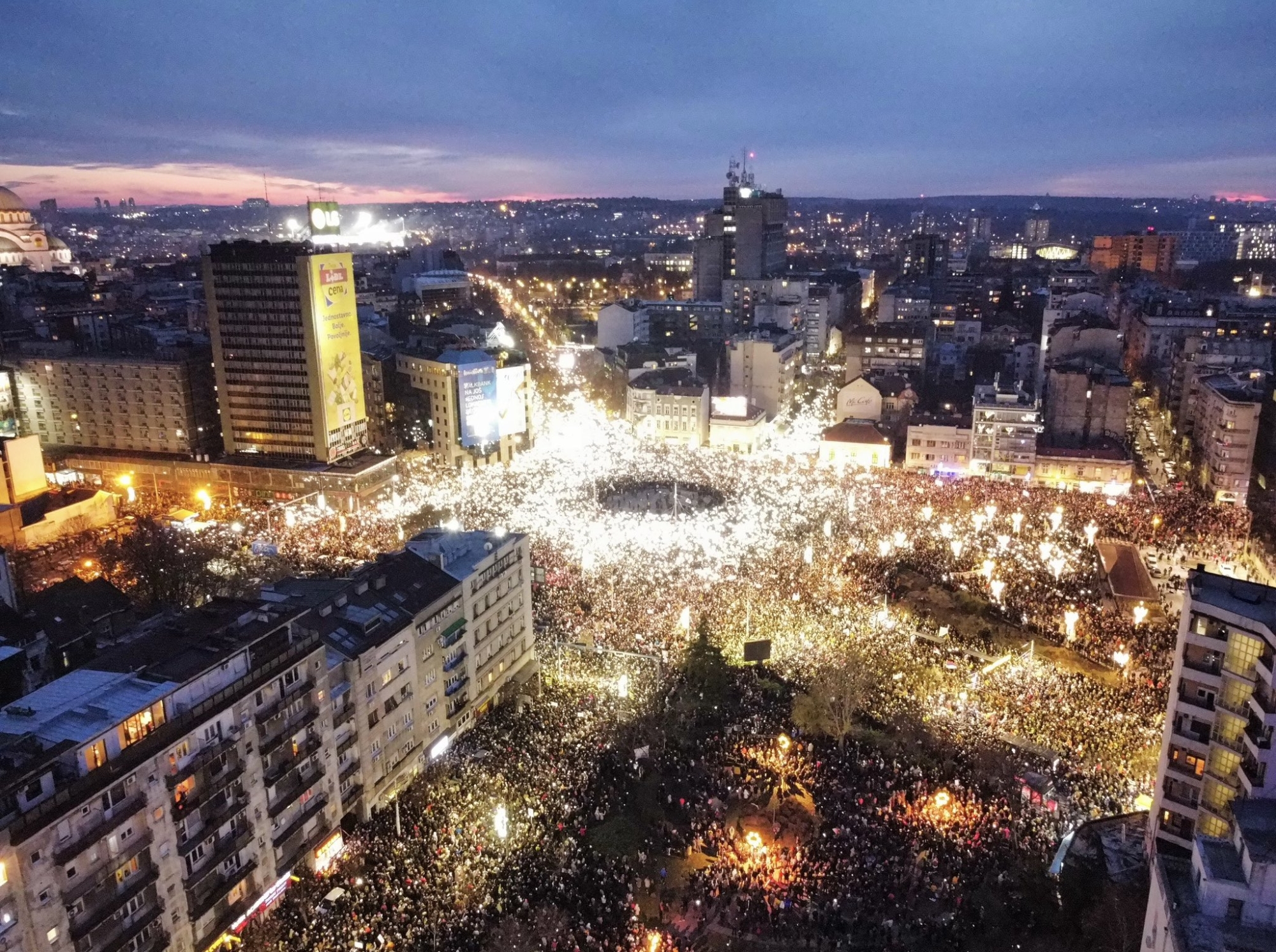Serbia
Serbia is in turmoil – ongoing mass protests

Protests in Serbia.
© CRTASerbia is in turmoil – ongoing mass protests
What began with student demonstrations in November has now evolved into mass protests across Serbian generations. The ruling system of President Aleksandar Vucic is under enormous pressure. Vučić has already been forced to sacrifice his prime minister, Miloš Vučević. Lennart Jürgensen spoke to Markus Kaiser, FNF's project director for the Western Balkans, about the political developments in Belgrade.
Lennart Jürgensen: How did the resignation of Prime Minister Vučević come about? What role do the student protests that have been going on since November play in this?
Markus Kaiser: On the surface, the students are demanding a complete investigation into an accident on 1 November in Novi Sad that cost fifteen people their lives due to botched construction work. Above all, however, they are demanding rule of law, and that the institutions provided for in the Serbian constitution govern the country, not the all-powerful President Aleksandar Vučić on his own. That is why the tragedy in Novi Sad was the trigger, but not the cause of the mass protests.
In my opinion, we are not dealing with a government crisis, but a societal crisis. For a decade and a half, a small but significant part of Serbian society – around ten percent of the Serbian population are members of Aleksandar Vučić's all-dominant Serbian Progressive Party (SNS) – has been enriching itself at the expense of everyone else. Many Serbs are aware of the consequences such as lawlessness, corruption and a lack of a future, but many of them have been afraid of repression. The students have now taken this fear away from a part of society.

What do you think of Prime Minister Vučević’s resignation? Will President Vučić be able to calm the unrest in the country, or is he demonstrating the fragility of his position of power?
With the resignation of Prime Minister Vučević, Vučić is trying to regain the reins of power. After the president promised to fulfil all demands in a speech broadcast nationwide by all channels yesterday evening, “his” prime minister is sacrificed one day later. However, it is precisely this behaviour that shows that in Serbia, everything is decided by the president, and it is precisely this unconstitutionality that is driving people onto the streets. Even if the resignation of the prime minister is the biggest possible offer that Vučić can make, it is also the biggest possible admission that everything in Serbia is controlled by him.
The question is whether Serbs will carry the protest through to the end. Serbian society already rebelled against a head of state 25 years ago, and subsequently experienced profound disruptions to its way of life. The big question is whether people are prepared to embark on this experiment a second time. The memories of the fall of Slobodan Milošević and the uncertainty that followed hover over everything here.

How should the EU/Germany position itself? How can the Serbian opposition and civil society be supported and democratic values given a greater voice in the country?
The EU has so far let Aleksandar Vučić have his way because he promised stability and, most recently, raw materials such as lithium. The people here are well aware of this protection. Just as the EU addresses and punishes violations of the rule of law in its member states, it could also do the same with EU accession candidates, as Serbia continues to be one. The lack of criticism, even in the case of massive electoral fraud, has repeatedly left Serbian civil society out in the cold.
However, the Serbian opposition consists of Russophile parties, oligarch parties and only a handful of genuinely pro-European and democratic parties. Fifteen years of nationalist government propaganda have left their mark on the voting population. The regime is already spreading the narrative that the protests are a colour revolution controlled from abroad and that only the ruling party can protect Serbia from being taken over by foreign powers – which is all the more cynical as the EU and its member states have so far done nothing to seriously endanger the stability of the regime. It is therefore to be feared that under the current conditions, with a media landscape that denigrates the opposition and is completely devoted to and controlled by the government, the next election will be just as unfree as the previous ones. The Serbian people, who are expressing their fundamental displeasure with the situation in the country, are truly not to be envied politically.
Markus Kaiser is the project director of Friedrich Naumann Foundation for Freedom in the Western Balkans based in Belgrade.

